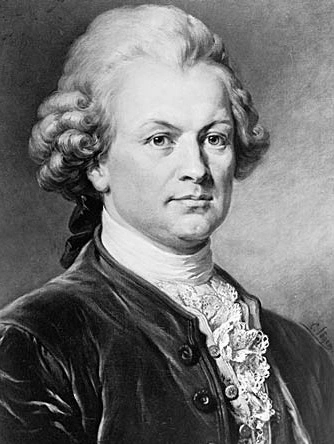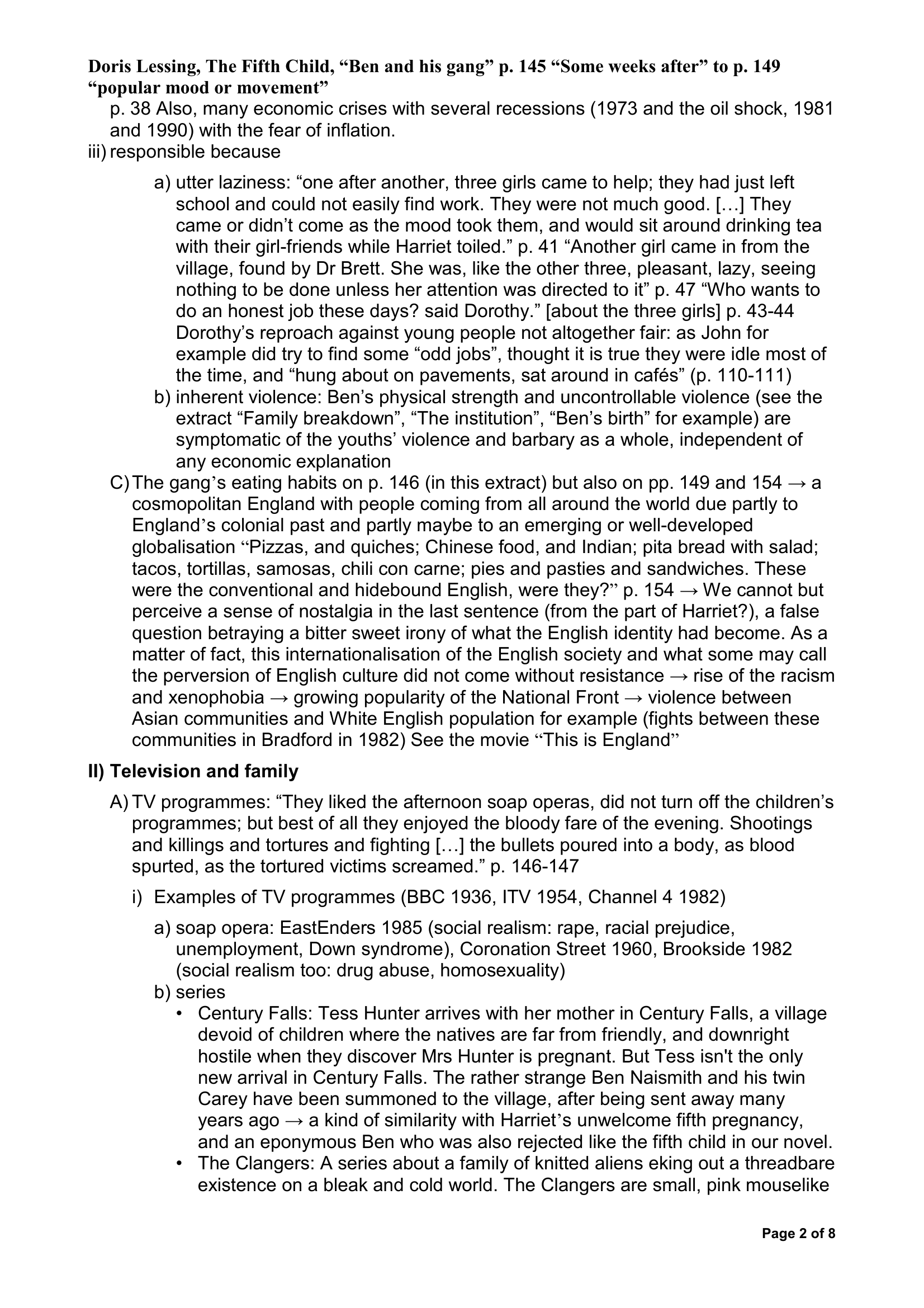Doris Lessing, The Fifth Child, ''Ben and his gang'' p. 145 ''Some weeks after'' to p. 149 ''popular mood or movement''
Publié le 25/06/2012

Extrait du document

I) England in the eighties
A)

«
Doris Lessing, The Fifth Child, “Ben and his gang” p.
145 “Some weeks after” to p.
149
“popular mood or movement”
Page 2 of 8
p.
38 Also, many economic crises with several recessions (1973 and the oil shock, 1981
and 1990) with the fear of inflation.
iii) responsible because
a) utter laziness: “one after another, three girls came to help; th ey had just left
school and could not easily find work.
They were not much good.
[…] They
came or didn’t come as the mood took them, and would sit around drinking tea
with their girl -friends while Harriet toiled.” p.
41 “Another girl came in from the
villa ge, found by Dr Brett.
She was, like the other three, pleasant, lazy, seeing
nothing to be done unless her attention was directed to it” p.
47 “Who wants to
do an honest job these days? said Dorothy.” [about the three girls] p.
43- 44
Dorothy’s reproach against young people not altogether fair: as John for
example did try to find some “odd jobs”, thought it is true they were idle most of
the time, and “hung about on pavements, sat around in cafés” (p.
110 -111)
b) inherent violence: Ben’s physical strength and uncontrollable violence (see the
extract “Family breakdown”, “The institution”, “Ben’s birth” for example) are
symptomatic of the youths’ violence and barbary as a whole, independent of
any economic explanation
C) The gang ’s eating habits on p.
146 (in this extract) but also on pp.
149 and 154 → a
cosmopolitan England with people coming from all around the world due partly to
England’ s colonial past and partly maybe to an emerging or well -developed
globalisation “Pizzas, and quiches; Chinese food, and Indian; pita bread with salad;
tacos, tortillas, samosas, chili con carne; pies and pasties and sandwiches.
These
were the conventional and hidebound English, were they?” p.
154 → We cannot but
perceive a sense of nostalgia in the last sentence (from the part of Harriet?), a false
question betraying a bitter sweet irony of what the English identity had become.
As a
matter of fact, this internationalisation of the English society and what some may call
the perversion of English culture did not come without resistance → rise of the racism
and xenophobia → growing popularity of the National Front → violence between
Asian communities and White English population for example (fights between these
communities in Bradford in 1982) See the movie “ This is England”
II) Television and family
A) TV programmes: “They liked the afternoon soap operas, did not turn off the children’s
programmes; but best of all they enjoyed the bloody fare of the evening.
Shootings
and killings and tortures and fighting […] the bullets poured into a body, as blood
spurted, as the tortured victims screamed.” p.
146 -147
i) Examples of TV programmes (BBC 1936, ITV 1954, Channel 4 1982)
a) soap opera: EastEnders 1985 (social realism: rape, racial prejudice,
unemployment, Down syndrome), Coronation Street 1960, Brooksi de 1982
(social realism too: drug abuse, homosexuality)
b) series
• Century Falls: Tess Hunter arrives with her mother in Century Falls, a village
devoid of children where the natives are far from friendly, and downright
hostile when they discover Mrs Hunter is pregnant.
But Tess isn't the only
new arrival in Century Falls.
The rather strange Ben Naismith and his twin
Carey have been summoned to the village, after being sent away many
years ago → a kind of similarity with Harriet ’s unwelcome fifth pregnancy,
and an eponymous Ben who was also rejected like the fifth child in our novel.
• The Clangers: A series about a family of knitted aliens eking out a threadbare
existence on a bleak and cold world.
The Clangers are small, pink mouselike.
»
↓↓↓ APERÇU DU DOCUMENT ↓↓↓
Liens utiles
- Essay English : In Arthur Miller’s play “All my sons”, Joe Keller is a hero in his family and in the neighborhood even if he did some very awful things.
- Luciano PavarottiIINTRODUCTIONLuciano PavarottiRenowned Italian tenor Luciano Pavarotti was known for his mastery of the highest notes of a tenor's range and for hisjovial personality, which helped him earn a wide popular following.
- John Huston John Huston (1906-1987), American motion-picture director and actor, who created some of the most critically acclaimed films of American cinema in his long and distinguished career.
- George Frideric Handel I INTRODUCTION Handel's Water Music In addition to his popular operas and oratorios, German-born composer George Frideric Handel wrote music in the 1700s for the church and for royal celebrations.
- Lincoln: "A House Divided" At the 1858 state Republican convention in Springfield, Illinois, the Republican Party's United States Senate candidate for Illinois and future president Abraham Lincoln delivered his famous "House Divided" speech.






